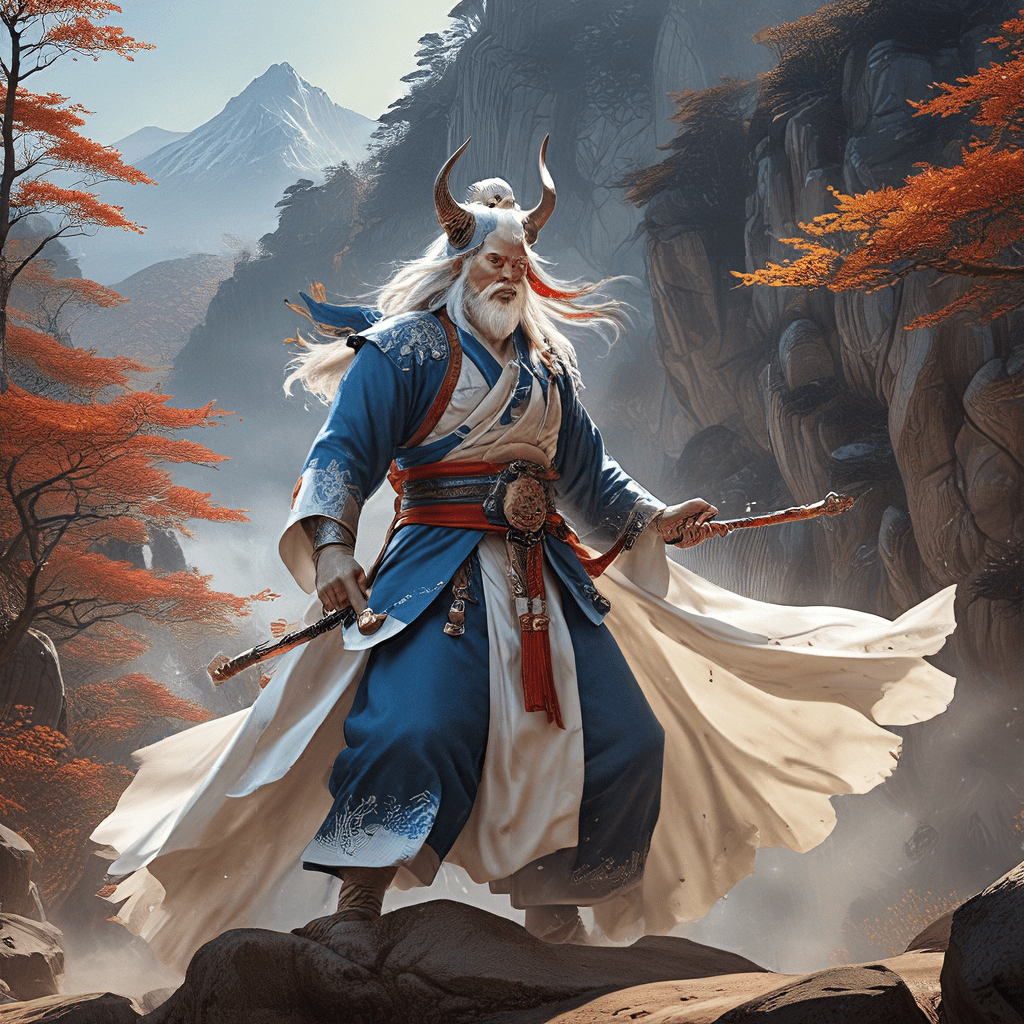The Mountain Spirit in Korean Mythology: A Guardian of Nature
In the heart of Korean mythology, nestled within the rugged peaks and lush valleys, lies a powerful and enigmatic figure: the Mountain Spirit, known as "San신" in Korean. This mythical entity is deeply interwoven with the fabric of Korean folklore, representing a profound connection between humans and the natural world. The Mountain Spirit is not just a supernatural being; it is the embodiment of the mountain itself, possessing its strength, wisdom, and aura of mystery. Throughout centuries, tales of the Mountain Spirit have been passed down through generations, shaping the Korean understanding of nature, respect for the environment, and the delicate balance between the human and the divine.
The Mountain Spirit: A Symbol of Power and Mystery
The Mountain Spirit is revered as a guardian of the mountains, a protector of the forests, and a powerful force of nature. Its presence is often felt in the whispers of the wind through the trees, the rumble of thunder echoing through the valleys, and the shimmering beauty of waterfalls cascading down the slopes. Stories depict the Mountain Spirit as a being of immense power, capable of shaping the landscape, controlling the weather, and influencing the fate of those who venture into its domain. This power is not wielded maliciously but rather as a force of balance, ensuring that the natural world remains in harmony.
The Tale of the Mountain Spirit: Origins and Evolution
The origins of the Mountain Spirit can be traced back to ancient Korean beliefs, deeply rooted in animism, the belief that spirits inhabit all things in nature. The concept of the Mountain Spirit evolved over time, taking on various forms and names depending on the region and the specific mountain it guarded. Often depicted as a powerful, humanoid figure with animalistic features, the Mountain Spirit's attributes and powers varied according to the stories. Some tales portray them as benevolent spirits who offer protection to humans, while others describe them as wrathful guardians who punish those who disrespect nature.
The Mountain Spirit: Embodiment of the Mountain’s Essence
The Mountain Spirit is not merely a separate entity; it is an integral part of the mountain itself, representing its essence, spirit, and power. This concept reflects the deep-seated Korean reverence for nature, viewing mountains as sacred and embodying divine energy. The Mountain Spirit's form often reflects the mountain's unique features, with its appearance shaped by the mountain's peaks, valleys, and vegetation. The relationship between the Mountain Spirit and its mountain is symbiotic, each influencing and sustaining the other.
The Mountain Spirit’s Powers and Abilities
The Mountain Spirit commands immense power over the natural world. They can control the weather, summoning rain or drought at will, and unleashing storms and floods to deter those who disrespect their domain. They are said to have the ability to shapeshift, taking on various forms to disguise themselves or to intimidate potential threats. The Mountain Spirit's power is not solely focused on destruction, however, as they are also capable of healing, granting good fortune, and protecting those who respect nature and its balance.
Interactions with Humans: Blessings, Curses, and Sacrifices
The relationship between humans and the Mountain Spirit is complex and often involves a delicate balance of respect, offerings, and appeasement. People who lived near the mountains understood the importance of maintaining harmony with the spirits. Offerings of food, drink, and sometimes even sacrifices were left at sacred sites or mountain peaks to honor the Mountain Spirit and ask for their protection.
Respect for the mountains was paramount. Humans were cautioned against cutting down trees without permission, hunting excessively, or polluting the mountain's pristine environment. Failure to respect these guidelines could result in the Mountain Spirit's wrath. Stories warn of curses, illness, or even natural disasters as punishments for those who offended the spirits. Conversely, those who showed respect and offered proper offerings could expect blessings, bountiful harvests, protection from harm, and even assistance in times of need. This intricate relationship between humans and the Mountain Spirit highlights the profound connection between humans and nature, emphasizing the importance of living in harmony with the natural world.
The Mountain Spirit’s Role in Korean Folklore and Literature
The Mountain Spirit plays a central role in Korean folklore and literature, appearing in countless stories, legends, and myths. These tales often serve as cautionary reminders to respect the natural world and its powerful forces. Some stories explore the themes of human greed and the consequences of disrespecting nature, while others highlight the importance of humility and reverence. Many Korean folktales feature the Mountain Spirit as a pivotal character, shaping the narrative, offering guidance, or delivering justice.
These stories not only entertain but also educate, reinforcing the deep-seated belief in the power of the Mountain Spirit and the importance of maintaining harmony with the natural world. Literary works like "The Mountain Spirit" by Kim Yongsoo and "The Tale of the Mountain Spirit" by Kim Manjung explore the complex relationship between humans and nature, often portraying the Mountain Spirit as a wise and powerful figure who can reward or punish based on human behavior. These stories help solidify the Mountain Spirit’s enduring impact on Korean culture and understanding of the world.
The Mountain Spirit: A Reflection of Korean Values and Beliefs
The concept of the Mountain Spirit is deeply ingrained in Korean culture and reflects the country’s long-held values and beliefs. A deep reverence for nature, particularly mountains, is evident in Korean society. Mountains are considered sacred spaces, embodying spiritual power and a connection to the divine. The Mountain Spirit embodies this reverence, serving as a guardian, protector, and symbol of nature's power.
The belief in the Mountain Spirit also reinforces the Korean value of harmony. The relationship between humans and the Mountain Spirit emphasizes the importance of living in balance with the natural world. This includes not just respecting the environment, but also understanding the interconnectedness of all living things. The Mountain Spirit serves as a reminder of the consequences of disrupting this balance and the need for human responsibility towards nature. Overall, the Mountain Spirit represents a profound respect for nature, a belief in its power, and the importance of living in harmony with it.
Theories on the Origins of the Mountain Spirit
The origins of the Mountain Spirit can be traced back to several factors. The prevalence of animism in ancient Korean culture, with its belief that spirits inhabit all things in nature is a major influence. Mountains, with their towering presence, rugged terrain, and unpredictable weather patterns, were naturally seen as powerful and spiritual places. The belief in mountain spirits might have stemmed from a desire to explain and appease these natural forces, as well as to understand the unpredictable events that occurred in the mountains.
Another theory suggests that the concept of the Mountain Spirit evolved from the worship of ancestors, particularly those who died in the mountains or were associated with nature. These ancestors were venerated as protectors and guardians of their domains, and their spirits were thought to reside in the mountains, watching over those who lived there. The concept of the Mountain Spirit may have also been influenced by shamanism, with its belief in the ability of shamans to communicate with spirits and harness their power. Shamans often played a significant role in mediating between humans and spirits, including the Mountain Spirit.
The Mountain Spirit’s Lasting Influence on Korean Culture
The Mountain Spirit continues to resonate deeply in Korean culture, influencing various aspects of Korean life. From traditional art forms like painting and literature to modern media like films and television shows, the Mountain Spirit remains a powerful and enduring figure. Many traditional Korean folktales and myths feature the Mountain Spirit, shaping the cultural narrative and passing down knowledge about respect for nature and traditional beliefs.
The Korean relationship with nature, rooted in the belief in the Mountain Spirit, is evident in the country's landscape and cultural practices. Mountains are not merely geographical features but are considered sacred spaces, often visited for pilgrimages, meditation, and spiritual renewal. The Mountain Spirit serves as a reminder of the importance of respecting nature, preserving natural resources, and living in harmony with the natural world. This enduring influence underscores the deep connection between humans and the natural world, a connection that is deeply rooted in Korean mythology and continues to shape the country's cultural landscape.
FAQ
Q1: What is the Mountain Spirit in Korean mythology?
The Mountain Spirit is a powerful mythical being, often depicted as a humanoid figure with animalistic features, who is believed to inhabit and protect mountains. They are considered guardians of nature, embodying the mountains' essence and power.
Q2: What are some of the Mountain Spirit's powers?
Mountain Spirits are known to control weather, shapeshift, heal, grant good fortune, and punish those who disrespect nature.
Q3: How do humans interact with the Mountain Spirit?
Humans interact with the Mountain Spirit through offerings, sacrifices, and respectful behavior. They are expected to show reverence for nature and avoid actions that harm the environment.
Q4: What is the Mountain Spirit's role in Korean culture?
The Mountain Spirit plays a significant role in Korean culture, representing the deep-seated reverence for nature, serving as a symbol of balance, and reminding people of the importance of respecting the natural world.
Q5: How does the Mountain Spirit impact Korean life today?
The Mountain Spirit continues to influence Korean culture, inspiring art, literature, and modern media. It encourages respect for nature, environmental preservation, and a deeper connection to the natural world.




